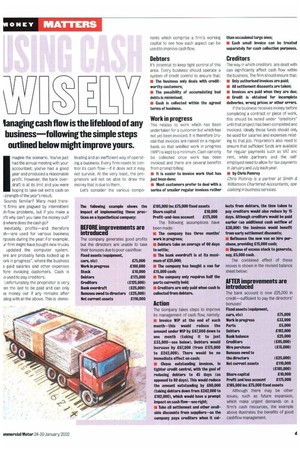lanaging cash flow is the lifeblood of any business—following the simple steps outlined below might improve yours.
Page 41

If you've noticed an error in this article please click here to report it so we can fix it.
Imagine the scenario. You've just had the annual meeting with your accountant; you've had a good year and produced a reasonable profit. However, the bank overdraft is at its limit and you were hoping to take out extra cash on !strength of the year's result.
Sounds familiar? Many road transI firms are plagued by intermittent ih-flow problems, but if you make a fit why can't you take the money out? d where does the cash go?
Inevitably, profits—and therefore sh—are used for various business rposes during the year. For example, Jr firm might have bought new trucks updated the computer system. ere are probably funds locked up in ork in progress", where the business s paid salaries and other expenses fore invoicing customers. Cash is ,o used to pay creditors.
Unfortunately the proprietor is very :en the last to be paid and can only ce money out if any remains after aling with all the above. This is demo tivating and an inefficient way of operating a business. Every firm needs to control its cash flow—if it does not it may not survive. At the very least, the proprietors will not be able to draw the money that is due to them.
Let's consider the various compo nents which comprise a firm's working capital to see how each aspect can be used to improve cash flow.
Debtors
It's essential to keep tight control of this area. Every business should operate a system of credit control to ensure that: • The business only deals with creditworthy customers; • The possibility of accumulating bad debts is minimised; • Cash is collected within the agreed terms of business.
Work in progress
This relates to work which has been undertaken for a customer but which has not yet been invoiced. It is therefore crucial that invoices are raised on a regular basis so that unbilled work in progress (WIP) is kept to a minimum. Cash can only be collected once work has been invoiced and there are several benefits from prompt billing:
• It is easier to invoice work that has just been done; • Most customers prefer to deal with a series of smaller regular invoices rather
than occasional large ones; • Each small Invoice can be treated separately for cash collection purpose&
Creditors
The way in which creditors are dealt with can significantly affect cash flow within the business. The firm should ensure that: • Only authorised invoices are paid;
• All settlement discounts are taken;
• Invoices are paid when they are due; • Credit is obtained for incomplete deliveries, wrong prices or other errors.
If the business receives money before completing a contract or piece of work, this should be noted under "creditors" until that project has been completed and invoiced. Ideally those funds should only be used for salaries and expenses relating to that job. Proprietors also need tc ensure that sufficient funds are availablE for regular payments such as VAT anc rent, while partners and the self employed need to allow for tax payments in January and July each year.
• by Chris Pornroy Chris Pomroy is a partner at Smith & Williamson Chartered Accountants, sue cialising in business services.












































































































































